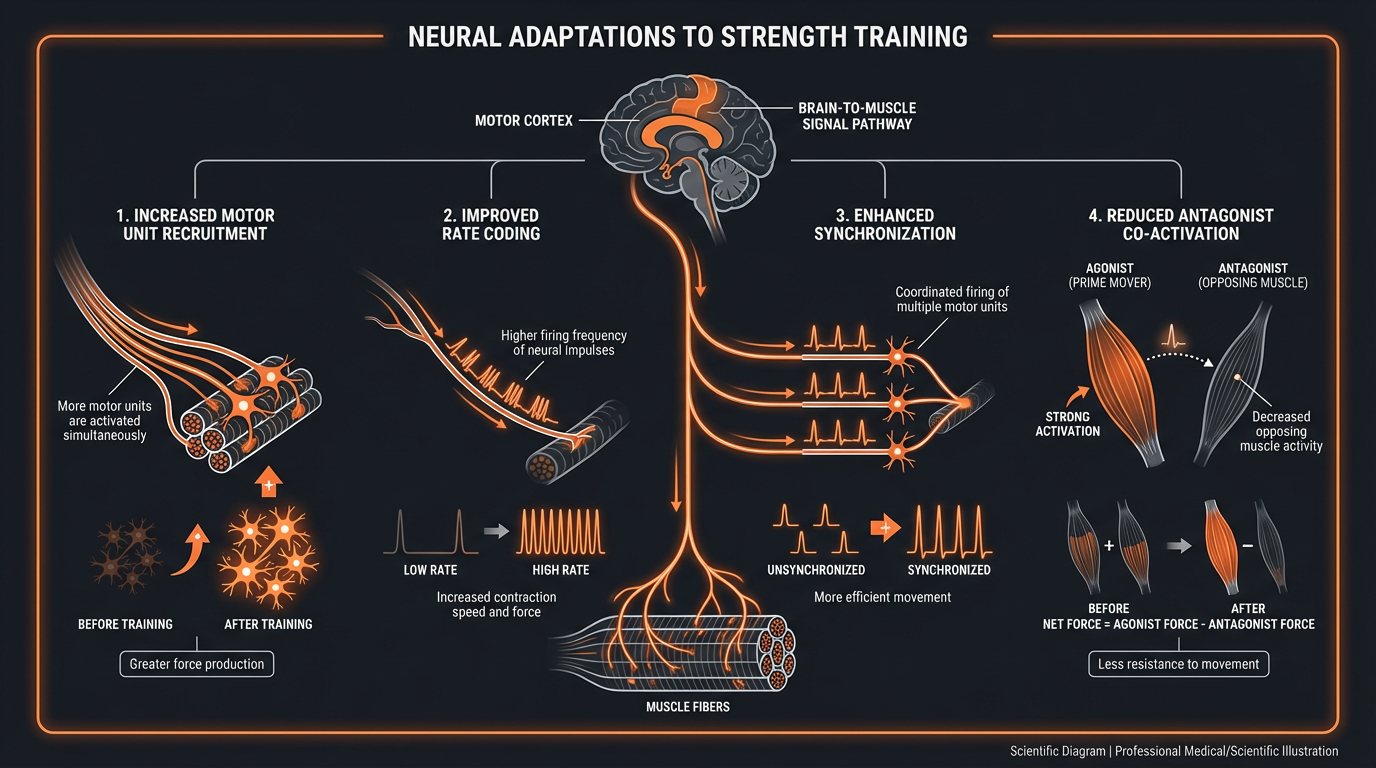The Science of Cravings: Why We Have Them and How to Control Them
Read our comprehensive guide on the science of cravings: why we have them and how to control them.

Key Takeaways
- Your brain releases dopamine when you eat tasty food, which makes you want that same food again later.
- Low serotonin levels make you crave carbs, and nutrient deficiencies can trigger specific food cravings.
- Eating balanced meals throughout the day keeps your blood sugar steady and prevents random cravings from hitting.
- Not getting enough sleep messes with your hunger hormones and makes you crave junk food more.
- Stay hydrated because your body sometimes confuses thirst for hunger and makes you think you're craving food.
Get a Free AI Coach on WhatsApp
Ask questions, get workout plans, and track your progress — all from WhatsApp.
Message Your CoachCravings are a universal human experience, striking at any moment, whether it's the sudden urge for chocolate late at night or an unplanned detour to grab a burger. Understanding the science of cravings can empower us to manage them effectively. This article delves into The Science of Cravings: Why We Have Them and How to Control Them, shedding light on the underlying mechanisms and offering practical strategies for control.
What Causes Cravings?
The root causes of cravings are complex and multifaceted. At their core, cravings are influenced by a variety of physiological, psychological, and environmental factors. Key contributors include:
- •Hormonal Fluctuations: Hormones such as leptin, ghrelin, and serotonin play pivotal roles in hunger and cravings. For instance, low levels of serotonin can lead to carbohydrate cravings.
- •Nutrient Deficiencies: Sometimes, cravings are the body's way of signaling a lack of essential nutrients. A craving for salty foods may indicate low sodium levels, while a chocolate craving could signal magnesium deficiency.
- •Emotional Triggers: Stress, sadness, or boredom can often lead to emotional eating. The brain releases comfort-inducing dopamine when consuming high-sugar or high-fat foods, reinforcing the craving cycle.
- •Environmental Cues: Advertising, social settings, and even the sight or smell of food can trigger cravings.

The Role of the Brain in Cravings
The brain's reward system plays a significant role in cravings. When we eat something enjoyable, the brain releases dopamine, the 'feel-good' neurotransmitter. This release reinforces the behavior, making us more likely to seek out the pleasurable experience again. A study published in the journal *Cell Metabolism* found that calorie-dense foods high in sugar and fat can alter brain activity, making these foods more rewarding (Zheng et al., 2022).
Moreover, the hippocampus, the brain’s memory center, strengthens the associations between specific foods and pleasurable experiences. This is why certain foods, like a family recipe or a favorite childhood snack, can trigger strong cravings, evoking memories and emotions.
How to Control Cravings
Understanding the mechanisms behind cravings is the first step in managing them. Here are practical strategies to help you take control:
- •Eat Balanced Meals: Consuming well-balanced meals throughout the day can help maintain steady blood sugar levels, reducing the chance of sudden cravings.
- •Stay Hydrated: Dehydration can sometimes be mistaken for hunger. Drinking water regularly can help prevent this confusion.
- •Mindful Eating: Paying attention to what and how much you eat can prevent mindless snacking. Practicing mindfulness can also help you recognize and manage emotional eating.
- •Get Enough Sleep: Lack of sleep can disrupt hormone levels, particularly ghrelin and leptin, leading to increased hunger and cravings.
- •Find Healthy Alternatives: When cravings strike, satisfy them with healthier options. For example, choose fruit instead of candy or nuts instead of chips.
Answering Common Questions About Cravings
Many people have questions about cravings, such as:
- •Can cravings indicate a health issue? Yes, in some cases, cravings can be a sign of nutrient deficiencies or hormonal imbalances. It’s important to pay attention and consult a healthcare professional if needed.
- •Is it okay to give in to cravings occasionally? Moderation is key. Occasionally indulging can be part of a balanced diet but should not become a frequent habit.
- •Do cravings differ between men and women? Yes, hormonal differences, especially during menstrual cycles in women, can lead to varying cravings.
Conclusion
Cravings are a natural part of human biology and psychology. By understanding the science behind cravings, you can develop strategies to manage them effectively. Start by paying attention to your body's signals, ensuring balanced nutrition, and adopting healthy lifestyle habits. Taking these steps will empower you to control cravings rather than being controlled by them.
If you're struggling with persistent cravings, it might be worth consulting a nutritionist or healthcare professional for personalized advice. Remember, the journey to better health starts with small, informed choices.
Frequently Asked Questions
- Why do I crave junk food when dieting?
- Your body produces more ghrelin (hunger hormone) and less leptin (fullness hormone) during a calorie deficit. It's a survival mechanism, not a willpower failure. Eating more protein, fiber, and staying hydrated helps blunt the cravings.
- How do I stop craving sugar?
- Eat enough protein (it reduces sugar cravings significantly), don't skip meals, and get 7+ hours of sleep. Sleep deprivation increases sugar cravings by up to 30%. Also, going completely cold turkey on sugar usually backfires, so allow small amounts.
- Are cravings a sign of nutrient deficiency?
- Rarely. Craving chocolate doesn't mean you need magnesium, despite what the internet says. Most cravings are driven by habit, stress, and the brain's reward system, not actual nutritional needs.
- Does drinking water reduce food cravings?
- It helps more than you'd think. Thirst is often mistaken for hunger, and drinking 16 oz of water before meals has been shown to reduce calorie intake by about 75-90 calories per meal. It won't eliminate cravings, but it takes the edge off.